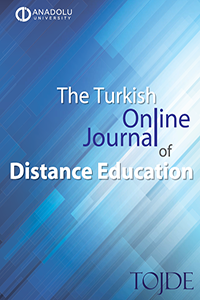Abstract
References
- Alraimi, K. M., Zo, H., & Ciganek, A. P. (2015). Understanding the MOOCs continuance: The role of openness and reputation. Computers & Education, 80, 28-38.
- Arpaci, I. (2015). A comparative study of the effects of cultural differences on the adoption of mobile learning. British Journal of Educational Technology, 46(4), 699-712.
- Altbach, P. G. (2014). MOOCs as neocolonialism: who controls knowledge?. International Higher Education, 75, 5-7.
- Balakrishnan, V. (2017). Key determinants for intention to use social media for learning in higher education institutions. Universal Access in the Information Society, 16(2), 289-301.
- Bali, M., Crawford, M., Jessen, R., Signorelli, P., & Zamora, M. (2015). What makes a cMOOC community endure? Multiple participant perspectives from diverse cMOOCs. Educational Media International, 52(2), 100-115.
- Baturay, M. H. (2015). An overview of the world of MOOCs. Procedia-Social and Behavioral Sciences, 174, 427-433.
Abstract
Massive Open Online Courses, also known as MOOCs, figure as the main trend in the international educational market in recent years, characterized by the offer of free, open access and global courses. Although many current studies address issues like design, quality and acceptance of these courses, little attention has been given regarding cultural aspects that could influence this global open learning movement. Therefore, the aim of this paper is to investigate cultural determinants of MOOCs offering, through a cross-country analysis. To this end, four cultural factors proposed by Hofstede were considered. Through the multivariate regression analysis, we evaluated the relation between these factors and the number of MOOCs offered in each country. The results show that Individualism presents a significant and positive effect on MOOCs offering. Power Distance, Uncertainty Avoidance and Masculinity dimensions of culture do not present significant effect on MOOCs offering. This means that although individuals from countries with higher rates of Masculinity and lower levels of Uncertainty Avoidance and Power Distance are more likely to attend online courses, universities in these countries are not necessarily the ones offering more MOOCs. The results of the study may be useful to support the implementation of strategies for the diffusion and internationalization of MOOCs.
References
- Alraimi, K. M., Zo, H., & Ciganek, A. P. (2015). Understanding the MOOCs continuance: The role of openness and reputation. Computers & Education, 80, 28-38.
- Arpaci, I. (2015). A comparative study of the effects of cultural differences on the adoption of mobile learning. British Journal of Educational Technology, 46(4), 699-712.
- Altbach, P. G. (2014). MOOCs as neocolonialism: who controls knowledge?. International Higher Education, 75, 5-7.
- Balakrishnan, V. (2017). Key determinants for intention to use social media for learning in higher education institutions. Universal Access in the Information Society, 16(2), 289-301.
- Bali, M., Crawford, M., Jessen, R., Signorelli, P., & Zamora, M. (2015). What makes a cMOOC community endure? Multiple participant perspectives from diverse cMOOCs. Educational Media International, 52(2), 100-115.
- Baturay, M. H. (2015). An overview of the world of MOOCs. Procedia-Social and Behavioral Sciences, 174, 427-433.
Details
| Primary Language | English |
|---|---|
| Journal Section | Articles |
| Authors | |
| Publication Date | October 1, 2020 |
| Submission Date | September 16, 2019 |
| Published in Issue | Year 2020 Volume: 21 Issue: 4 |


